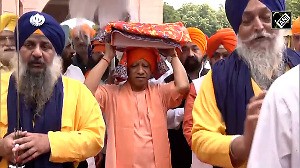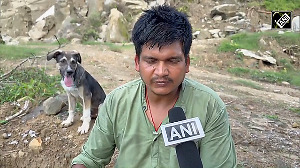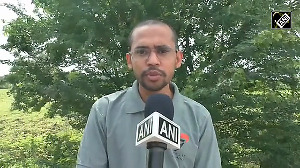 Aziz Haniffa reports from Washignton, DC, on Foreign Secretary Sujatha Singh’s three-day visit to the US capital.
Aziz Haniffa reports from Washignton, DC, on Foreign Secretary Sujatha Singh’s three-day visit to the US capital.
In all of her interactions over three days of intensive discussions with senior Pentagon, State Department and National Security Council officials, Foreign Secretary Sujatha Singh was urged by the Obama administration that India use its influence with and lean on Afghan President Hamid Karzai -- who visits New Delhi later in the week -- to sign the bilateral security agreement with the United States.
Singh, who held a record number of back-to-back meetings with a pethora of senior US officials that also included those at the Departments of Energy and Commerce, and also several US lawmakers on both the Senate and House side, was also updated on Washington’s negotiations with Iran and the first step of an agreement to lift sanctions against Teheran as a quid pro quo for the latter’s acquiescence to forgo any development of a nuclear weapons capability.
During her meeting at the State Department with Deputy Secretary of State William Burns, Secretary of State John F Kerry dropped in for about 15 minutes to meet with Singh and discuss bilateral and regional issues and reiterate the importance of taking forward the US-India strategic partnership.
Meanwhile, Singh and her diplomatic vis-à-vis Wendy Sherman, under secretary of state for political affairs, had a telephonic discussion as the earlier scheduled meeting at the State Department couldn’t take place as Sherman had to urgently leave for Chicago on a personal matter.
The sources, acknowledging the plea by US officials to Singh that India persuade Karzai to sign the BSA, said, “India has always welcomed the BSA between the US and Afghanistan,” but noted that Singh had made clear that “without getting into the details of what it is in its present form, that is something for Afghanistan to decide and for it to come to an understanding with the United States.”
“We’ve always supported that (the BSA),” the sources noted, and said Singh had told Washington, that Delhi would continue to do so.
Singh had agreed, according to the sources, that India would suggest to Karzai that “signing the BSA would be a good thing.”
However, the sources said there was no case of India leaning on Karzai and pressuring him to do it. “In our interactions with our foreign partners, we don’t ask -- we suggest that it would be a good idea.”
The sources acknowledged that the US had raised the possibility of the zero option (of no US troops remaining in Afghanistan if the BSA is not signed) “but they didn’t link it to India needing to do more to fill in the gap. These are two separate things completely.”
On Iran, the sources said, “There was an update on their discussions and their interactions, and there was appreciation for the fact that India had reduced its imports of oil from Iran.”
“To that extent, that’s where India is involved in the issue. (But) There was really no talk about India playing a role in the rapprochement’ between the US and Iran,” the sources emphasised.
Besides Kerry and Burns, Singh met with Assistant Secretary of State for South and Central Asian Affairs Nisha Desai Biswal, Deputy Secretary of Energy Daniel Poneman, Under Secretary of Defense Dr James Miller, Deputy National Security Adviser Anthony Blinken, and Under Secretary of Commerce Eric Hirshhorn.
She also went up on Capitol Hill to meet with Senator Mark Warner, Virginia Democrat and co-chair of the India Caucus in the Senate, Robert Menendez, New Jersey Democrat and chair of the Senate Foreign Relations Committee, and about half-a-dozen members of the House Foreign Affairs Committee led by chairman Ed Royce, California Republican.
Singh also participated in a Strategic Security Dialogue with Rose Gottemoeller, acting under secretary of state for arms control and international security and interacted with scholars and experts at the Carnegie Endowment for International Peace.
Sources said that the economic content of the foreign secretary’s talks was also an integral part of the discussions with the US officials and had included “discussions of issues of concern to US firms and issues of concern to our firms.”
“From our side,” the sources said, “we raised the issue of the immigration bill and the concerns they cause us, and especially on the Hill, raised this and they were alive to our concerns and the fact that they would affect our IT firms.”
Image: Foreign Secretary Sujatha Singh (fourth from left) and US Secretary of State John F Kerry (second from right) at a delegation-level meeting at the US State Department on December 10, 2013 ' Photograph: Courtesy US Department of State.











